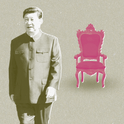Former Chinese Premier Wen Jiabao at Beijing No.1 Social Welfare House, a nursing home with a 100-year waiting list
When I walk into my grandparents’ bedroom, grandma is not in her usual spot, reclining against the rusty headboard of her queen-sized bed. Instead, she is sitting on grandpa’s bed, two feet apart from her own, while he perches on a creaky chair by the window, a dazed look on his face. Spread out on grandma’s bed is the cotton quilt she uses all year long. Mum, sitting on a plastic stool in the aisle, is stitching a piece of fabric onto it. Hearing my footsteps, she raises her eyes briefly: “She’s here!” she announces.
A monthly visit to my grandparents’ place is a family ritual of ours. For as long I can remember, my parents and I have made regular trips to their home in south-western Beijing, diagonally across the city from us. We first travelled by bus, clutching boxes of seasonal fruits and freshly slaughtered duck or chicken, while struggling to keep our foothold in the tightly packed compartment. Soon we switched to taxi and, a few years later, a newly purchased Toyota. Eight years ago, aged 17, I went to the United States to study. Returning last year, I rejoined my parents on their visits. We have moved closer to my grandparents’ place, but the roads we used to breeze through have now become as crowded as those buses we rode more than a decade ago.
Amid the whirlwind of changes in my life, my grandparents’ place feels oddly static: a pile of shoeboxes lies under a layer of dust; the light bulb in the bathroom takes so long to fully illuminate that it is kept perpetually lit; the quilt on grandma’s bed has accompanied her for decades, its floral patterns now a blur of faded red, yellow and green. Twice a year, she unstitches the bottom of the quilt to wash it, before stitching it back on. This year, she picked up the needle and after half an hour put it down, reaching for the telephone. “Could you come a little earlier this weekend?” she asked mum with a sigh.
I sat down with grandma. She peppers me with questions about my new apartment, my roommates and my writing projects while shooting occasional looks in mum’s direction. “Have you not finished yet? There’s no need to be too meticulous with the needle work.” Grandma waves her hand at the quilt. “It usually takes me only 10 minutes!”
Mum has been stopping by grandma’s place more frequently in recent years. First, it was the slip grandpa took in the bathroom, where he banged his head against the sink. Then it was the quarrel they had with the home-care attendant over an issue neither grandma nor grandpa could recall. That led to tearful phone calls in the early hours, which sent mum from the other side of town to their place, rushing grandpa to the hospital, putting a hand on grandma’s trembling shoulder, picking up the smashed glasses and sending away the flustered attendant. My aunt and uncle—grandma’s two other children—both live nearby, but mum has always been the first person she calls. She is her oldest child.
Several years ago, an advertisement caught mum’s eye. A new residential compound named “Sun City” was rising in an idyllic suburb in northern Beijing. Branded as the city’s first “commercial housing designed for elderly needs,” it boasted a spacious dining hall, a free spa, a state-of-the-art hospital and community nurses on call 24/7. Mum brought the ad to grandma, who took one glance at it. “I won’t squander all my savings on this.” At 20,000 RMB (over £2,000) per square metre, the price intimidates all but the most well-heeled families. Plus, “it takes over two hours to for you to drive over,” she grumbled to mum. “What if we have an accident in the house?”
Grandma herself has thought about nursing homes, but after some initial research, the idea produced, instead of possible locations to visit, a list of facts she liked to dispense. “Do you know Beijing has a 100-year waiting list for its nursing home?” she chuckled in her croaky voice. “Perhaps I would have applied if I had powerful connections!”
Still, grandma considers herself lucky. At 82, she is able to cook for herself, and help grandpa to the toilet on his late night trips to the bathroom. All three of her children are a phone call away. It is a situation that would draw envy from many others. There are a total of 185 million people over the age of 60 in China. Two decades into China’s vast labour migration to urban areas, many of them are separated from their children by thousands of miles. In recent years, the government has aggressively expanded pension and health-care coverage for the elderly. Still, with rural residents receiving an average annual pension of just 720 yuan (£78), these measures are falling short. Lack of care for the elderly has been so widespread that the government recently issued a new law, making regular visits to parents mandatory for adult children. And the one-child policy will likely exacerbate these problems in the coming years, with a generation of only children facing the full responsibility of caring for their parents.
Mum finishes her last few stitches, and ties the end of the thread into a knot. “Done!” Grandma leans over to examine the needlework. “The bottom sheet has shrunk too much from washing,” says mum, tugging at it. “It doesn’t seal the edges as well as it used to.”
“No problem. This will do!” declares grandma with a wave of her hand. “I’ve done this myself all my life,” she says, turning to me. “It’s an important skill. You should learn it too.”
“You’re right.” I smile. “Though we use a different kind of quilt at home. The entire thing can be machine washed. Let me bring you a set next time. It saves a lot of trouble.”
“That’s fine. I probably won’t be able to fall asleep in it!” Grandma laughs and shakes her head. “Nothing feels quite like old cotton against your skin.” She touches the newly stitched seams, and tucks her feet under her old quilt. “This is what I need.”












